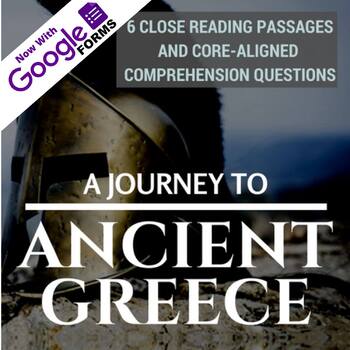A Journey to Ancient Greece
- PDF
Description
A Journey to Ancient Greece consists of six Ancient Greece reading passages. Each passage includes 10 comprehension questions, and is differentiated at three Flesch-Kincaid text levels: Grade 3, Grade 5, and Grade 7. An answer key is included.
Passage 1: The Birthplace of Western Civilization
In this informational text, students are introduced to the beginnings of ancient Greek civilization. They will learn about:
• The geography of Greece
• The ancient Greek monarchies
• The significance of Greek civilization
Vocabulary: Peninsula • Century • Independent • Monarchy • Overpopulation
Passage 2: The First Democracy: A Debate
This passage is styled as a two-person debate. The two debaters are discussing whether or not ancient Athens should be considered a democracy. Students will learn:
• The definition of democracy
• How Athenian democracy functioned
• Who was and was not represented by Athenian government
Vocabulary: Democracy • Banish • Citizen • Immigrant • Minority
Passage 3: A Journey to Sparta
In this first-person historical fiction narrative, students read a letter from an Egyptian who has just visited Sparta. Students will learn:
• The key differences between Athens and Sparta
• The trade relationship between ancient Greece and ancient Egypt
• The difference between Spartan and Egyptian governments
Vocabulary: City-State • Custom • Council • Warlike • Ally
Passage 4: Greek Mythology
In this informational text, students are given an overview of ancient Greek religious beliefs. They will study:
• The purpose of mythology in Greek life
• The definition of polytheism
• The key Greek gods and goddesses
Vocabulary: Myth • Mythology • Polytheistic • Fortune • Offering
Passage 5: Asking the Right Questions
Written in the style of a newspaper article, “Asking the Right Questions” introduces students to Ms. Addo’s class. They are studying Greek philosophy as part of a World Philosophy Day celebration. Students will learn:
• What philosophy is
• Who Socrates was and why his questions got him into trouble with the people of Athens
• How to hold a philosophical debate
Vocabulary: Tunic • Philosophy • Dialogue • Corrupt • Debate
Passage 6: The Legacy of Ancient Greece
This informational passage concludes a study of ancient Greece by examining how civilizations end. Students will explore:
• The legacy of Greece in the form of architecture, science, medicine, and mathematics
• How and when Greek civilization fell
• The influence of Greece on modern life
Vocabulary: Legacy • Oath • Column • Theorem • Astronomer





